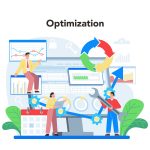
The Role of Artificial Intelligence in Future Web Development
- admin
- 28 November 2023
- Uncategorised
- 0 Comments
Artificial Intelligence (AI) has been a transformative force across various industries, and its impact on web development is increasingly significant. As technology continues to evolve, AI is reshaping the way websites are designed, developed, and experienced. Its integration into web development processes is unlocking new possibilities and enhancing user interactions in unprecedented ways.
1. Personalized User Experience
AI enables the creation of personalized web experiences tailored to individual users. Through machine learning algorithms, websites can analyze user behavior, preferences, and past interactions to deliver customized content. This personalization enhances user engagement by providing relevant recommendations, product suggestions, and content that aligns with the user’s interests.
2. Chatbots and Virtual Assistants
Chatbots powered by AI are revolutionizing customer service on websites. These intelligent bots can engage with users in real-time, answering queries, providing assistance, and guiding them through various processes. They enhance user experience by offering immediate responses, thereby increasing customer satisfaction and retention.
3. Automated Web Development
AI simplifies and accelerates web development through automation. Developers can utilize AI-powered tools to automate repetitive tasks like code generation, testing, and debugging. This automation streamlines the development process, reducing errors and allowing developers to focus more on creative aspects.
4. Enhanced SEO Strategies
AI plays a pivotal role in optimizing websites for search engines. AI algorithms assist in analyzing search patterns, user behavior, and preferences to refine SEO strategies. This enables developers to create content that resonates better with their target audience, thereby improving search engine rankings and visibility.
5. Responsive Web Design
With AI, websites can adapt and optimize their layout and design based on user preferences and device types. This ensures a seamless experience across various devices, from desktops to smartphones, by automatically adjusting content and layouts for better accessibility and user engagement.
6. Predictive Analytics
AI-powered predictive analytics aid web developers in understanding user behavior and predicting future trends. By analyzing vast amounts of data, AI can forecast user preferences, allowing developers to make informed decisions regarding website updates, content strategies, and user engagement tactics.
7. Security Enhancement
AI contributes significantly to bolstering website security. It can detect and prevent cyber threats by analyzing patterns in user behavior, identifying potential vulnerabilities, and implementing robust security measures to safeguard websites from malicious attacks.
In conclusion, the integration of AI into web development is reshaping the digital landscape. Its capabilities empower developers to create more intuitive, personalized, and secure web experiences. As AI continues to advance, its role in web development will likely expand, leading to even more innovative and user-centric websites in the future. Embracing AI in web development is not just a trend but a necessity in delivering enhanced user experiences and staying competitive in the digital realm.



